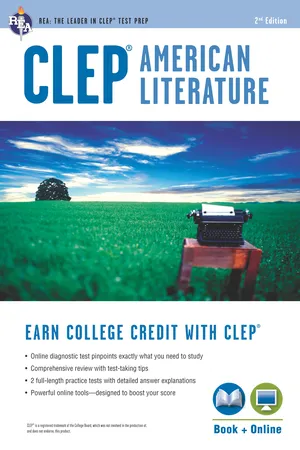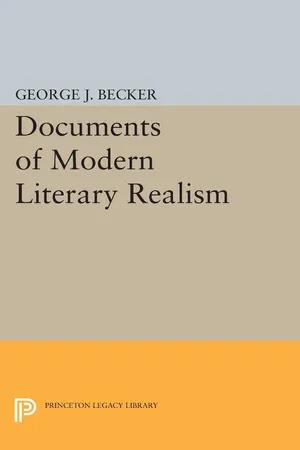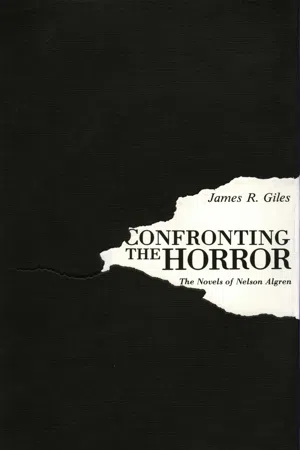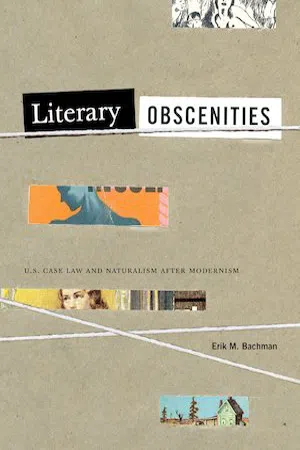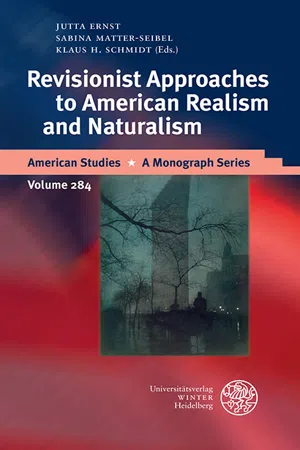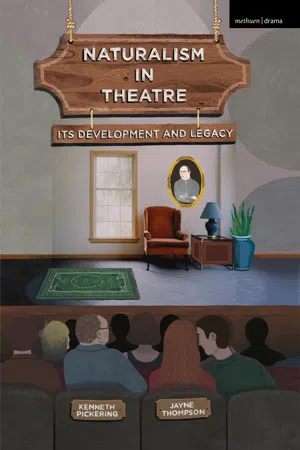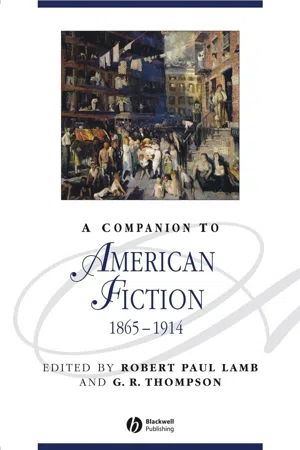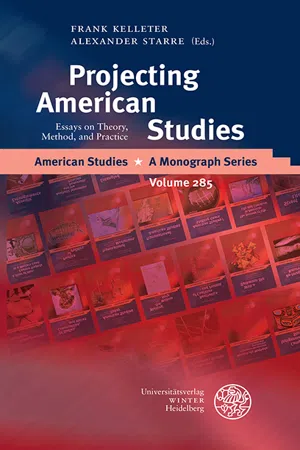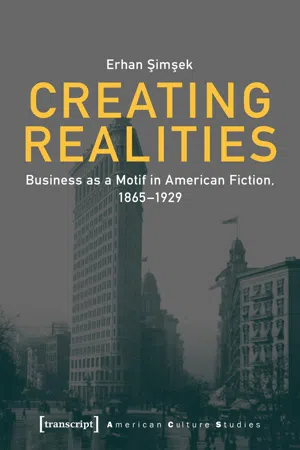Literature
American Naturalism
American Naturalism is a literary movement that emerged in the late 19th and early 20th centuries, focusing on the harsh realities of life and human nature. It portrays characters as victims of their environment and heredity, often depicting them in desperate and sordid circumstances. Naturalist writers sought to present a more objective and scientific view of the world, emphasizing the influence of external forces on individuals.
Written by Perlego with AI-assistance
Related key terms
1 of 5
10 Key excerpts on "American Naturalism"
- eBook - ePub
- Jacob Stratman(Author)
- 2016(Publication Date)
- Research & Education Association(Publisher)
Chapter 4 Realism and Naturalism (1865–1910) REALISMI am making a slight change to the dates that the College Board (creators of the CLEP tests) states in its literature. Some scholars believe that realism as a literary movement began closer to 1870, but many more scholars point to the beginning of the Civil War as the beginning of American literary realism. Bullets, bloodshed, and brotherly bickering ushered in a reality that reacted strongly to the idyllic existence American romanticism painted. Then, after the battles ended, America began to grow and to expand its urban areas at the expense of its rural areas. The Industrial Revolution and increased European immigration caused a boom in urban populations. Post–Civil War America found itself in an existence of disillusionment and cynicism. Major technological breakthroughs also occurred at the end of the nineteenth century: the invention of the telephone, the completion of the transcontinental railroad, and, of course, the introduction of the automobile. So literary realism is the label we give to those works that attempt to portray life as it actually is and not simply as the writer wishes (the latter being idealism). The brief historical information just mentioned is important because those incidents influenced writers who focused their plots and characters on the very immediate happenings of people in particular cultural moments. Realism is very interested in the mundane episodes of middle-class life; therefore, realist novels tended to lean towards social reform. Also, writers took it upon themselves to critically comment on America’s politics, economics, industry, and social issues, as well as gender, class, and race issues.NaturalismLiterary naturalism is said to be a product of scientific determinism. Here’s a simple definition: You are controlled by your environment. There is no hope for you. Dreams come and dreams go. You are controlled by your gender, race, socioeconomic standing, and ethnicity. There is a glass ceiling and you will hit it every time you venture beyond your status. Depressing, huh? Yes, it is. There is more to the literary movement than that, of course. Naturalism was greatly influenced by the work of Charles Darwin, Isaac Newton, Karl Marx, and Emile Zola, and other naturalists who posited that humans are not that different from animals in that they merely respond to natural and environmental forces without fully understanding the forces or their reactions to them. What is also important about naturalist fiction is that the author and the narrator are amoral in their depictions of the characters and the plot: they do not judge or editorialize; they merely observe. - eBook - ePub
Edith Wharton
New Critical Essays
- Alfred Bendixen, Annette Zilversmit(Authors)
- 2016(Publication Date)
- Routledge(Publisher)
The Age of Innocence and An American TragedyDonald PizerTulane UniversityNaturalism has been a significant literary movement in America for almost a century. From the early work of Stephen Crane and Frank Norris to the recent novels of Robert Stone and William Kennedy, the subject matter and fictional form of naturalism have continually attracted writers of stature.1 Of course, given the problematical philosophical base of naturalism, and given as well the often sensationalistic contents of a typical naturalistic novel, the movement has also been subject to intense attack. Indeed, one common assertion by those who would deny significance to naturalism in America is that the movement failed to survive its high point in the 1890s—this despite the powerful thread of naturalistic expression in most major American writers, including Hemingway and Faulkner, from the nineties to our own time.But naturalism, despite this critical hostility, refuses to go away, and thus, willy-nilly, has attracted a historiography over the last thirty or forty years—a historiography which contains several seemingly permanent and irrefutable assumptions about the movement. The difficulty presented by these assumptions, of course, is that they may serve to hinder rather than aid in the identification of works which can usefully be discussed as naturalistic. This screening role often played by the conventional historiography of American Naturalism is nowhere more evident than in the almost complete neglect of Edith Wharton in discussions of the movement. In an effort to locate Wharton’s major work more clearly and fully within American Naturalism, I will initially discuss those beliefs about the history of American Naturalism which have prevented a close examination of her most finished novel, The Age of Innocence, as naturalistic fiction. I will then take up The Age of Innocence and Theodore Dreiser’s An American Tragedy - eBook - PDF
- George Joseph Becker, George Becker(Authors)
- 2015(Publication Date)
- Princeton University Press(Publisher)
We can note that their line extends from Norris and the early Dreiser through Farrell and Steinbeck. We can describe their principles, note how these were modified in practice, and finally try to reach some judgment of their literary remains. Naturalism has been defined in two words as pessimistic de- * Cowley, Malcolm, "A Natural History of American Naturalism," Kenyon Review, Summer 1947. In expanded form this appeared under the title "Natural- ism in American Literature," in Persons, Stow (ed.), Evolutionary Thought in America, Yale University Press, 1950. The article, reprinted by permission of the author and the Yale University Press, corresponds to pages 313-333. 429 M A L C O L M C O W L E Y terminism and the definition is true so far as it goes. The naturalis- tic writers were all determinists in that they believed in the omni- potence of abstract forces. They were pessimists so far as they believed that men and women were absolutely incapable of shap- ing their own destinies. They regarded the individual as "a pawn on a chessboard"; the phrase recurs time and again in their novels. They felt that he could not achieve happiness by any conscious decision and that he received no earthly or heavenly reward for acting morally; man was, in Dreiser's words, "the victim of forces over which he has no control." In some of his moods, Frank Norris carried this magnification of forces and minification of persons to an even greater extreme. "Men were nothings, mere animalculae, mere ephemerides that fluttered and fell and were forgotten between dawn and dusk," he said in the next-to-last chapter of The Octopus. "Men were naught, life was naught; FORCE only existed—FORCE that brought men into the world, FORCE that made the wheat grow, FORCE that garnered it from the soil to give place to the succeeding crop." But Norris, like several other naturalists, was able to combine this romantic pessimism about individuals with romantic optimism about the future of mankind. - eBook - ePub
Confronting the Horror
The Novels of Nelson Algren
- James R. Giles(Author)
- 2011(Publication Date)
- The Kent State University Press(Publisher)
Recent critical studies have focused on the historical and sociological forces which gave rise to naturalism as literary genre. In “American Literary Naturalism: The French Connection,” Richard Lehan asserts that the rise of literary naturalism in France “cannot be divorced from a historical process that saw the movement from a landed to an urban economy, saw the rise of the bourgeoisie and at least the appearance of republican government, and that was ultimately founded on empirical/scientific assumptions about reality which, coupled with the new technology and power of money (new banks and credit theories), led to the impulse of nationalism and the rise of empire” (530). After discussing Zola’s exhaustive attempt to document in fiction this dimension of French literary naturalism, Lehan points out that “the aftermath of the Civil War in America parallels the kind of historical changes taking place in France between 1848 and 1870 as both economies moved from a landed to a commercial/industrial world. In America this period witnessed the rapid growth of cities, the rise of corporate businesses, the influx of immigrant labor, and the practice of wretched working conditions” (545). According to Lehan, naturalism as literary genre must be seen as a purely historical phenomenon. It was, he believes, supplanted by modernism when “the generation of T. S. Eliot, Ezra Pound, James Joyce, and Virginia Woolf rejected the scientific basis of naturalism” and “replaced the mechanistic assumptions of naturalism with the more organic elements of symbolism and myth, relying on a human consciousness and theory of time mainly derived from Henri Bergson.” After World War II, he concludes, “literary naturalism was all but dead,” and “the world of Zola gave way to that of Thomas Pynchon” (556–57).In her 1985 book, Form and History in American Literary Naturalism, June Howard also emphasizes the historical and socioeconomic conditions which produced American literary naturalism. Like Lehan, she views the late nineteenth-century urbanization of America as a central factor in the emergence of the genre. Urbanization was accompanied by “the greatest volume of immigration ever recorded,” she writes; “in 1880, 80 percent of the population of New York was foreign-born or born of immigrants; in Chicago the figure was 87 percent; in Detroit 84 percent; in St. Louis and San Francisco, 78 percent” (33). A new “foreign” urban proletariat thus emerged in America.Howard is especially perceptive in her analysis of the importance of point of view in turn-of-the-century American literary naturalism. The American naturalists were responding to a society characterized by an “omnipresent class conflict” (ix–x); and, just as for all fiction, an established, homogenized middle class constituted the dominant readership for their books. This middle-class readership inevitably saw the new foreign city dweller as a source of danger. Howard points out that “any study of late nineteenth-century and early twentieth-century America encounters … the sense … that there is an immediate threat to social order, a sense that the very foundations of American life are endangered.” As a consequence, the turn-of-the-century reading public felt an urgent need to comprehend “the increasingly visible and largely immigrant industrial proletariat living in the cities” (75). Yet Howard also argues persuasively that the middle-class fascination with the new urban proletariat resulted from more than a need to comprehend. She utilizes Sartre’s concept of projection of the Other to explain the full complexity of this fascination. The foreign city dweller became the evil Other for the homogenized middle class. Middle-class fears of uncontrolled and abnormal sexuality, of failure, of latent violence were projected onto this new and “unassimilated” urban American. Thus, for the middle class, the “terrain” of the urban proletariat took on an “exotic” aspect; and “like the anthropologist, the naturalist ventures into an exotic land to bring back reports on the savage inhabitants” (140). The various landscapes of the “savage” proletariat become “internal colonies” about which the naturalist, functioning as social scientist, reports to the civilized middle class (173). - Erik Bachman(Author)
- 2017(Publication Date)
- Penn State University Press(Publisher)
89 Correlatively, now that its afective wellspring had been depleted, literary naturalism in the 1950s was said to be “[spread] out so far that it covers the whole literary landscape—but very thinly.” 90 Naturalism no longer existed as an independent mode of writing, though that did not belie the likelihood that all U.S. fction would continue to bear a naturalistic impress for some time. As a result, the problem for critics was increasingly that of recognizing literary naturalism when they saw it. Every writer and critic of naturalism in this period appeared to have his or her own sense of how to defne it, and no consensus seemed to be evolving from this clash of informed opinions. Arguably the best expression of literary naturalism’s elusiveness as a concept at this time is to be found in an audio lecture recorded by Erskine Caldwell entitled “Naturalism and the American Novel” (1953). Using the talk mostly to get in some jabs at the same literary critics who had spent the past decade calling into question his worth as a writer of fction, when they were not simply ignoring him altogether, Caldwell starts by admitting that the “critical man of letters” is “by reason of heritage, birth, and environment, . . . a man far superior in mind and morals, and a man who can outtalk a mere writer of fction anytime, anywhere.” Consequently, as “a mere writer of fction,” Caldwell himself must be whatever it is these men of letters say he is. Unfortunately, it seems that these vastly superior men of morality and knowledge cannot quite make up their minds as to what to do with him: “Some critics have called me a realist, and I came to believe them. Other critics have called me a romanticist, and I came to believe them too.- No longer available |Learn more
- Jutta Ernst, Sabina Matter-Seibel, Klaus H. Schmidt(Authors)
- 2018(Publication Date)
- Universitätsverlag Winter(Publisher)
K EITH N EWLIN Recent Trends in American Literary Realism and Naturalism and the Example of Jack London Since scholars first attempted to outline the contours of American real-ism and naturalism in the 1950s and 1960s, hundreds of books have appeared, ranging from monographs attempting definition, such as Lars Åhnebrink’s The Beginnings of Naturalism in American Fiction (1950) and Harold H. Kolb’s The Illusion of Life: American Realism as a Liter-ary Form (1969), to reassessments, such as Michael Davitt Bell’s The Problem of American Realism (1993) and Eric Carl Link’s The Vast and Terrible Drama: American Literary Naturalism in the Late Nineteenth Century (2004), to more recent companions and handbooks, such as Donald Pizer’s The Cambridge Companion to American Realism and Naturalism (1995) and Robert Paul Lamb and G. R. Thompson’s A Companion to American Fiction, 1865–1914 (2009). And I have added to this babel of essays with The Oxford Handbook of American Literary Naturalism (2011) and, now under contract, a companion volume, The Oxford Handbook of American Literary Realism . Given the now over-whelming number of books—not to mention the thousands of articles devoted to authors and individual works—what more possibly can be said? As it turns out, a great deal. We should never take human ingenuity lightly, or underestimate the stimulus of publish-or-perish to propagate interesting, if not groundbreaking, work. In preparing an essay for a collection entitled Revisionist Approaches to American Realism and Naturalism , I decided to focus on scholarship published between 2009 and 2015, mostly in order to impose some limit on work that might be seen as “[r]evisionist.” I have organized what follows into three parts. It - eBook - PDF
Naturalism in Theatre
Its Development and Legacy
- Kenneth Pickering, Jayne Thompson(Authors)
- 2018(Publication Date)
- Red Globe Press(Publisher)
This naturalism was the basis of a major new kind of writing, and the philosophical position was explicitly argued: cf. Strindberg: ‘the naturalist has abolished guilt by abolishing God’; ‘the summary judgments on men given by authors […] should be challenged by naturalists, who know the richness of the soul-complex and recognize that “vice” has a reverse side very much like virtue’ ( Preface to Lady Julie, 1888). A new importance was given to the environment of characters and actions. ( Environment in its special and I N I T IA L D E F I N I T I O N S | 5 now primary sense of the conditions, including the physical conditions, within which someone or something lives and develops, was an associated eC19 development from the earlier general sense of surroundings.) Character and action were seen as affected or determined by environment , which espe-cially in a social and social-physical sense had then to be accurately described as an essential element of any account of a life.This connected with the sense of careful and detailed observation, from natural history, but it was not (as was later supposed) detailed description for its own sake, or from some conventional plausibility; rather it rested on the new and properly naturalist sense of the determining or decisive or influential effect of an environment on a life (in the variations between determining and influential much of the subsequent development can be understood) […] (218–19) Williams, in his essay ‘Social Environment and Theatrical Environment – The Case of English Naturalism’ provides a more concise overview: ‘there are three relevant senses of Naturalism and the associated “naturalist” and “naturalistic”’ (1980: 125). The first and probably most commonly used relates to: ‘a method of “accurate” or “lifelike” reproduction’ which we might more usefully consider as technical Naturalism. The second relates to ‘a philosophical position allied to science, natural history and materialism’ (125). - eBook - PDF
- Robert Paul Lamb, G. R. Thompson, Robert Paul Lamb, G. R. Thompson(Authors)
- 2008(Publication Date)
- Wiley-Blackwell(Publisher)
Realist/naturalist novelists seek to construct ‘‘a cohesive social world to contain the threats of social change’’ (Kaplan 1988: 12, 160). Yet this social instability cannot be fully contained. In aiming for order, the novels ‘‘pose problems they cannot solve’’ (Kaplan 1988: 160). The social turmoil that triggers ideological management in naturalism is, most recent critics contend, associated with the economic and cultural shift experienced by US society in its transition from the nineteenth to the twentieth century. This historical narrative had admittedly long been identified as naturalism’s anchoring ground. Georg Luka ´cs had argued that the passage from realism to naturalism marks the disappearance of the pre-1848 entrepreneurial bourgeoisie and its supersession by monopoly capitalism (1970: 118). US critics, when they describe the demise of Howellsian realism and the rise of naturalism in the 1890s, articulate an American variant of this scenario. Post-1980s scholars revisit this history either by judging it from a novel political angle or by focusing on its hitherto neglected dimensions. Unlike Parrington and Kazin, some fault naturalism for failing to resist capitalistic incorporation (see Howard 1985: 70–103; Bowlby 1985: 1–34; Seltzer 1992: 44). American Literary Naturalism 105 Conversely, others praise it for perceptively mapping the new corporate realm and for registering the supposedly irreversible passing of the producers’ ethos on which classical realism relied (see Michaels 1987: 40–1). Gender-focused approaches rewrite the turn-of-the-century transition as a psy-chosocial shift. Naturalism, in this view, signals the end of puritanical, work-ethic-oriented selfhood. - No longer available |Learn more
Projecting American Studies
Essays on Theory, Method, and Practice
- Frank Kelleter, Alexander Starre(Authors)
- 2018(Publication Date)
- Universitätsverlag Winter(Publisher)
J AMES D ORSON Seeing Double: Reading Naturalism after the New Historicism Rarely has literature stirred the blood of critics the way naturalist fiction has done. From the moral charge that Émile Zola “fills our minds with pus” (Ferragus 25) to the aesthetic one that Theodore Dreiser “wrote like a hippopotamus” (Berryman 150), naturalism has often served as a battle-ground for proxy wars between greater cultural and political interests. Just as naturalist characters are subject to forces beyond their control, naturalism itself has repeatedly taken center stage in the melodramas of intellectual history. While it was originally championed as protest literature by progres-sive critics—an expression of “the class hatreds of the eighties and nineties, the bleakness of small-town life, the mockery of the nouveaux riches, and the bitterness in the great new proletarian cities” (Kazin 15)—by the 1950s, thanks largely to Lionel Trilling’s takedown of Dreiser in his essay “Reality in America,” it had become the punching bag of New Critics and early Americanists with their Cold War preference for the tragic complexities of romance over the class antagonisms of realism. The tables were turned once again on naturalism as French Theory and the New Historicism converged in the 1980s. Here the realist and naturalist texts that had been pushed to the sidelines of literary history by the earlier generation of critics were now taken up and flaunted as evidence of how race, gender, and class antagonisms were festering just beneath the glittery surface of American culture. Yet just as the forces of ideology critique looked triumphant, discontent arose amidst the ranks of historicizers. Now critics are coming out in droves as surface read-ers, questioning the once so impregnable logic of symptomatic reading. But as the battleground has shifted in this newest critical tug-of-war, the upshot is that naturalism no longer figures as an ideological hostage. - eBook - PDF
Creating Realities
Business as a Motif in American Fiction, 1865–1929
- Erhan Simsek(Author)
- 2019(Publication Date)
- transcript Verlag(Publisher)
Then there was a sudden last return of energy. McTeague ’ s right wrist was caught, something licked upon it, then the struggling body fell limp and motionless with a long breath. (442) The intermediary control is lost at the end; readers are condemned to feel the shock. 156 | Creating Realities In fact, this process of diminishing spectatorial distance between the narrator and the narrated was the harbinger of American modernism. As Chapter 5 ex-plores, the modernist narrator approaches the character so closely that he enters characters ’ minds and streams their consciousness, a technique that epitomizes the modernist movement. An early form of this technique is already visible in Amer-ican naturalism. Walcutt counts “ stream of consciousness ” (21) as one of the forms that American Naturalism assumes. The first-person narration of a seem-ingly omniscient narrator as in the case of Dreiser ’ s novels demonstrates the presentation of characters ’ minds clearly. Yet, this decreasing distance between the narrator and the world was a highly experimental and premature objective for American naturalists; they did not have a clear concept behind it. It was American modernists who programmatically utilized the representation of the mind as a cen-tral technique in their communicative program, hence the transitory nature and shorter lifespan of naturalism in contrast to realism or modernism. American Naturalism and Journalism The late nineteenth century was fertile ground in terms of sensational narratives of intensity not least because of yellow journalism or jingoistic press. Canonical naturalists such as Theodore Dreiser, Frank Norris, Stephen Crane, Upton Sinclair and Jack London worked as journalists before or during their literary career. In order to construct the specific narrative/semiotic structure that would evoke this new, shocking reality effect, American naturalists drew on their experiences in journalism.
Index pages curate the most relevant extracts from our library of academic textbooks. They’ve been created using an in-house natural language model (NLM), each adding context and meaning to key research topics.
